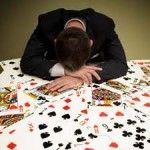Sex
Behavioral Addictions vs. Substance Addictions
Whether it's drugs, booze, sex, or gambling, the brain can't tell the difference
Posted June 17, 2013
I was recently at a conference on behavioral addictions. Two days of talks by experts—psychologists, neuroscientists, psychiatrists, clinical researchers, etc.—who want to understand compulsive gambling, eating disorders, hypersexuality, and internet or gaming addiction. It was not only a great conference, but it happened to be in Budapest—a real bonus.

Coming in from the airport by cab, I felt I was crossing into another dimension. Mile after mile of hulking, dilapidated rectangular buildings, looking like they were last used 70 years ago to make bomb parts for the war. There was this stale ghost of leftover Communism everywhere. Everything looked shut down, grey slabs of concrete under a grey sky. But then at some invisible line the shabbiness rolled back to reveal a land of Oz: Enormous but gorgeous monuments to a thousand years of changing architecture -- churches, castles, museums, fountains‚—with elaborate arches and elegant turrets, tapering to slender needles pointed at the sky. All connected by wide avenues, full of shoppers, and bridges that appeared to be held up by steel lace. History oozing out of every stone in every facade. Yet it still felt like the kind of place where a lot of people lived difficult lives and the mesmerizing temptations of addiction would appear in all their forms.
As a one-time drug addict who now studies drug addiction, I knew a lot about substances, but not a thing about the behavioral addictions. My naive view was that they were cheap imitations of the real thing. Was I ever wrong.
In two days I learned so much, met so many amazing people, discovered new research strategies, new devices, new recovery tools. For example, I chatted for an hour with a man named Robert Pretlow, a physician who spent two years—full-time—developing a cell-phone app that lets you chat with other recovering individuals, warns you about addictive triggers, reminds you about your own effective coping strategies, records your progress day by day. It's like having a treatment center in your pocket. Dr. Pretlow is using it to study eating disorders, but it seems that it could be applied to many other addictive problems as well.
I learned about the hidden dangers in sex and gambling. What's it like when you really can't stop?

This was not one of those conferences where you have to douse yourself with coffee to keep awake. I learned about the diversity of eating disorders—from binging, which looks a lot like substance addiction, according to Marc N. Potenza at Yale—to anorexia—which looks more like over-control. A lot of talks focused on OCD, obsessive-compulsive disorder, and quite a few speakers connected the compulsive nature of OCD with that of addiction. People talked about stages in the development of addiction and compared them with stages in the development of OCD. One guy showed how the progression of stages of addiction coverged with the progression of stages in OCD—starting out in different places but ending up almost completely overlapping.

And these people weren't just talking about behavior. There were neuroscience data in half the talks, and much of it showed parallels between addictions of many stripes and OCD. The striatum was the overwhelming star of the show—the ventral striatum (or nucleus accumbens) and its role in craving and reward seeking, and the dorsal striatum responsible for compulsion (stimulus-response conditioning). It appears that OCD sufferers talk about their compulsions a lot like addicts talk about their addictions. I don't want to stop it. I know it's bad for me, but it makes me feel better. And their brains light up in almost all the same places! In fact, their brains show changes in synaptic density (some areas getting more connected, other areas getting less connected) that look exactly like what you see in addicts, over the same time frame, as they get worse—or better.
So, it might seem counterintuitive, but heroin addicts, codependent partners, gaming addicts, and sex addicts are very, very much alike. In other words, you don't have to be a heroin addict or an alcoholic to wreck your life. You can wreck it just as well by spending 18 hours a day on the internet, while the bills pile up, the unemployment cheques fizzle out (and you didn't notice), and your wife starts packing, not only her stuff but the kids' stuff too. You might reply: yeah, sure, but

substance addiction can kill you! Behavioral addiction? That's pretty wimpy in comparison. If you believe that, as I did, I've got news for you. According to the stats, obesity (frequently considered a result of food addiction) causes 4 - 5 times more "preventable deaths" in the U.S. than the number caused by alcohol.
In the next few posts I'm going to try to synthesize what I've learned about behavioral addictions—how they develop, how they stabilize, and most of all how the same or at least overlapping brain changes underlie all addictions.


